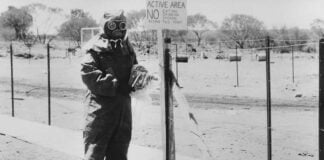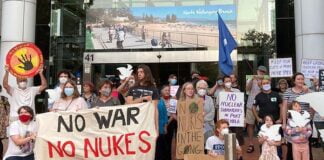Review: All Along the Watchtower, by Michael Hyde, The Vulgar Press, $32.95.
With this memoir, Michael Hyde opens us up to the world of 1960s revolutionary activists and gives a voice to the politics of the period.
Hyde was a leading activist in the Maoist-influenced Labor Club at Monash University during the anti-Vietnam war campaign.
Students organised against the Menzies government decisions, from 1964, to introduce military conscription of 18-year-old men and send troops to support the American war in Vietnam. From small beginnings where, “we had stood with less than 100 others in the rain”, they helped build the huge Vietnam Moratoriums—more than 100,000 marched in Melbourne alone on May 8, 1970.
Their preferred tactics were radical, some bordering on adventurism. July 4 demonstrations outside the US Consulate in Melbourne were planned as pitched battles with police. Student radicals armed with smoke bombs would lay siege to the Consulate, attempting to storm the building.
The Labor Club caused a storm by collecting money for the NLF war effort, a treasonous act in the eyes of Australian governments as they were “aiding the enemy”. Hyde recounts his trip to Cambodia, via Mao’s China, to hand-deliver the funds to a Vietnamese embassy.
Their efforts inspired and shifted the wider anti-war movement to the left.
To illustrate who benefited from war, they led an occupation of the Monash Careers and Appointments Office which was used to recruit graduates by businesses including the key companies profiting from the war, like Honeywell, General Motors and Conzinc Rio Tinto.
They built a defence campaign that successfully overturned student expulsions in response, winning solidarity from student unions around the country as well as an important 24-hour strike threat from the Waterside Workers union. Three thousand voted at a mass student meeting to occupy the Monash administration building.
In the wider movement off-campus, the radical students were on the fringe. Speeches like this one at an organising meeting for the 1970 Moratorium march at Melbourne’s Richmond Town Hall were applauded but Labor Club proposals were defeated:
“We want victory to the NLF (National Liberation Front). Sure, the Australian and American troops should leave but they won’t leave of their own free will… They will only leave when they are forced to do so. And that will happen through the fighting capacity of the NLF and through us making things really difficult at home… Smash US imperialism! Victory to the NLF!”
Maoism and the new left
By this stage the students had learnt, as Hyde put it: “… the university wasn’t a symbol of truth and justice and that the ‘neutrality of the courts’ was an equally hollow concept.” Many activists adopted “new left” revolutionary politics in opposition to the moderation of the Labor Party and the pro-Moscow Communist Party.
Hyde’s personal history reveals how young leaders dedicated their lives to struggle, and the sacrifices many were prepared to accept, including imprisonment, loss of career and, for some, their lives. Hyde himself recounts being threatened with a rifle by a mysterious stranger.
Many of them in Melbourne, including Hyde, joined the Maoist Communist Party (CPA-ML). They saw themselves as fighting for the total change we need—to take the power out of the hands of the capitalists and build socialism. But they believed Mao’s Chinese Communist regime and the now discredited “Cultural Revolution” represented a genuine socialist alternative to Stalinist Russia.
They had similar illusions that the Vietnamese Communist NLF would create a socialist society. The exposure of these regimes as dictatorships undermined their political convictions. The Vietnamese NLF needed to be supported against America, but not uncritically.
Hyde’s book is a memoir, not a political history. So he also takes us into his personal life in the 1960s counter-culture. For a more straight out political account of the anti-war campaign at Monash there is also the book, It is right to rebel, published under Hyde’s name in 1972.
This book remains an important contribution to an understanding of how people rebel. When the Vietnamese people began a ‘David-and-Goliath’ struggle they inspired a generation of young people facing their own oppressive societies. New struggles against racism, women’s oppression and for gay rights and worker’s rights emerged and won significant reforms.
The legacy of these struggles lives on and the US has never overcome their Vietnam “syndrome”, as the failed wars in Iraq and Afghanistan show.
Books like this help to rebuild a new movement for total change, to rid the world of capitalism’s scourges of global recession and endless wars and replace it with a genuine socialism from below.
By Judy McVey





